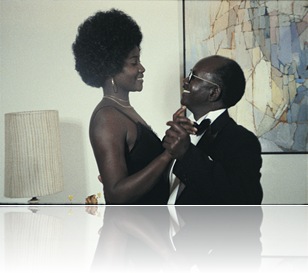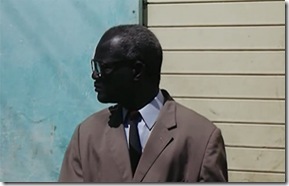1975
Director Ousmane Sembène
Xala is legendary African director Oumane Sembène’s take on the 1960 Senegalese shift to independence. Thierno Leye plays Aboucader Beye - otherwise known as “El Hadji” - one of a select group of bespectacled, bureaucratic businessmen who run this emerging nation almost literally from inside their cash-filled briefcases. Using the money from this latest deal, El Hadji acquires a third wife, but finds himself unable to consummate the marriage due to a bout of impotency referred to with a great deal of dread in the community as the “xala.”
to independence. Thierno Leye plays Aboucader Beye - otherwise known as “El Hadji” - one of a select group of bespectacled, bureaucratic businessmen who run this emerging nation almost literally from inside their cash-filled briefcases. Using the money from this latest deal, El Hadji acquires a third wife, but finds himself unable to consummate the marriage due to a bout of impotency referred to with a great deal of dread in the community as the “xala.”
There is a central problem limiting the enjoyment of Xala: it is, after all, a comedy - and a lengthy one at that - but is rarely funny. A political comedy certainly, with serious issues of corruption (the country is run by the wealthy elite) and overbearing patriarchy (El Hadji’s polygamous marriages) at its heart, but it is still a comedy nonetheless. The cultural differences would be foolish to ignore. Humour is extremely personal. The so-called “funny” scenes of Seven Samurai (Akira Kurosawa) or societal ennui of Week End (Jean-Luc Godard) remain as alienating now as ever. Cultural crossover is artistically problematic and frequently unsuccessful. Sembène’s efforts to generate humour feel equally forced. Characters are loud, bombastic and eccentric in both appearance and behaviour; more unsettling than entertaining.
 Striving to make his point as explicit as possible, Sembène has strayed into farcical waters. The metaphor of political impotence is outrageously blatant and lazy. An overreliance on the lowest form of humour is supposed to debase the presented political system, but this is no exercise in the Carnivalesque no matter how hard it tries.
Striving to make his point as explicit as possible, Sembène has strayed into farcical waters. The metaphor of political impotence is outrageously blatant and lazy. An overreliance on the lowest form of humour is supposed to debase the presented political system, but this is no exercise in the Carnivalesque no matter how hard it tries.
There is clearly intelligence in Xala. Its ending will haunt you forever. This makes it all the more infuriating that such a skilled filmmaker as Sembène - famed for his revolutionary work on Borom Sarret (1963) and Mandabi (1968) - would resort to what is, ultimately, a rather tame narrative.
*** / *****
No comments:
Post a Comment